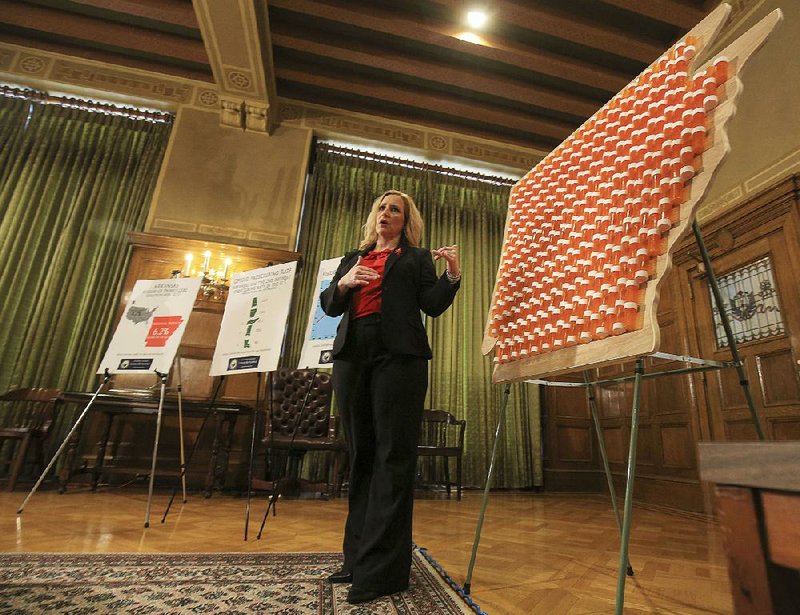Attorney General Leslie Rutledge's demand that a prosecuting attorney drop a lawsuit against opioid makers that's similar to her own drew harsh responses Wednesday from the leaders of a coalition of Arkansas county and city officials.
Two lawsuits blaming drug companies for fueling Arkansas' opioid crisis were filed in separate state courts last month, just days apart -- one by Rutledge, the other by Prosecuting Attorney Scott Ellington, who is representing the state, and lawyers representing 87 local governments.
Both suits allege that nearly two decades of opioid-makers' misleading advertising practices led to the flood of pain pills in the state -- where opioid prescriptions outnumbered Arkansans in 2016 -- and jeopardized residents' health and burdened taxpayers.
Now, Rutledge is arguing that as attorney general she is the state's "chief law officer" and that Ellington doesn't have the authority to represent Arkansas in the litigation, according to an emergency petition for writ of mandamus she filed Monday with the Arkansas Supreme Court.
Ellington is prosecuting attorney for the 2nd Judicial Circuit, which includes Clay, Craighead, Crittenden, Greene, Mississippi and Poinsett counties.
In the petition, Rutledge also said that Ellington consorted with more expensive, out-of-state lawyers, which could leave residents with less money if they won the suit because they don't have to abide by contingency fee caps under Arkansas law.
In a response filed with the high court Wednesday, Ellington said the attorney general's interpretation of the law was "cherry-picked" and that he had "concurrent power" to represent the state in litigation.
Ellington's response also denied associating with private, out-of-state lawyers, though they are listed in the opioid lawsuit he filed March 19 in Crittenden County Circuit Court.
He told the Arkansas Democrat-Gazette that those attorneys had existing contracts with the Association of Arkansas Counties and the Arkansas Municipal League, two groups involved with the coalition-led opioid suit.
Court records also reveal behind-the-scenes tensions regarding Rutledge's role in Arkansas' claims against opioid makers. Both Rutledge and coalition leaders say they intended to file a lawsuit first.
During discussions about merging their efforts, Rutledge was told she would only "play the role of a figurehead" and that the litigation would be controlled by out-of-state counsel, her petition says.
But coalition leaders described Rutledge's arguments in the writ request as a "slanted narrative ... to upend the progress made toward uniting Arkansas against the Opioid Crisis" in statements submitted Wednesday to the Supreme Court.
Chris Villines, executive director of the counties association, and Don Zimmerman, the municipal league's director, asserted that Rutledge "had no intention of working together" and that her representatives seemed to be stalling the filing of the coalition's lawsuit.
Rutledge told the newspaper Wednesday that she worked "tirelessly" with Ellington to "handle the matter in the best interest of all Arkansans," but he was "unwilling to do so," so she was forced to petition the Supreme Court.
In her petition, Rutledge argues that having two similar suits against the drug companies could harm the state's chances of recouping millions of dollars because of the likelihood of the cases being consolidated with pending federal lawsuits in Ohio.
Coalition leaders disagree and say that the suit filed in Crittenden County is "not at odds" with the attorney general's litigation.
"There is no reason why the two cannot proceed in concert," the coalition's response to Rutledge's writ request says.
The state's suit, filed in Pulaski County Circuit Court on March 29, seeks an injunction to stop what it calls deceptive marketing practices. It targets Purdue Pharma, Endo Pharmaceuticals and Johnson & Johnson, which Rutledge said manufacture the most-used opioids in the state.
Both seek punitive monetary damages.
Each complaint details the same methods they claim the sued companies used to mislead patients and doctors.
According to the suits, opioid manufacturers encouraged doctors to prescribe more painkillers, even when patients showed signs of addiction. Physicians were also paid to participate in "speaker bureaus" that promoted opioids during forums attended by other doctors. Many of these speaker-doctors and opioid-makers also worked with "front groups" claiming to be independent patient advocacy organizations to change how doctors, patients and officials perceive and recommend the use of painkillers.
RELATED ARTICLE
http://www.arkansas…">Cotton, Rutledge back death for drug dealers
Metro on 04/05/2018

